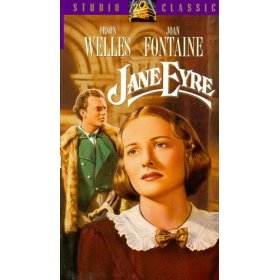
Today I watched the 1944 Jane Eyre starring Orson Welles and Joan Fontaine. It isn't one of the best versions I've seen so far, however. I didn't particularly take to any of the actors (and characters) in this film. They seemed too contrived, but I suppose this is the effect of the short running time of the movie. The Rochester in this version wasn't as irate as Hinds (I think no one can surpass this individual in this feat!), or as mournful as Hurt, or as dashing as Dalton, but he was more on the mellow side than otherwise. I am not sure if it is the actor's features, or if this was particularly intended for the movie, but I thought Rochester had a fierce look about him. They might have gone overboard with trying to make him look threatening...when this isn't necessary to effectively portray Rochester. I prefered Fontaine's Jane to Welles' Rochester in terms of characterization. The former showed glimpses of the different shades in Jane's character: she conveyed the expressions of delight and dissappointment quite well. But my favorite character in the movie would be young Jane. She was indeed rebellious, very outspoken, and headstrong. She had the right mix of the innocence of a child and the fire of a Revolutionary.
Two things that I noticed of significance are the cutting off of Helen's hair, and the absence of Bertha.
In the original novel, it is in fact another girl called Julia Severn who is accused of 'vanity' and has her hair cut off by Mr. Brocklehurst.
"Miss Temple, Miss Temple, what--WHAT is that girl with curled hair? Red hair, ma'am, curled--curled all over?" And extending his cane he pointed to the awful object, his hand shaking as he did so.
"It is Julia Severn," replied Miss Temple, very quietly.
"Julia Severn, ma'am! And why has she, or any other, curled hair? Why, in defiance of every precept and principle of this house, does she conform to the world so openly--here in an evangelical, charitable establishment--as to wear her hair one mass of curls?"
"Julia's hair curls naturally," returned Miss Temple, still more quietly.
"Naturally! Yes, but we are not to conform to nature; I wish these girls to be the children of Grace: and why that abundance? I have again and again intimated that I desire the hair to be arranged closely, modestly, plainly. Miss Temple, that girl's hair must be cut off entirely; I will send a barber to-morrow: and I see others who have far too much of the excrescence--that tall girl, tell her to turn round. Tell all the first form to rise up and direct their faces to the wall."
Miss Temple passed her handkerchief over her lips, as if to smooth away the involuntary smile that curled them; she gave the order, however, and when the first class could take in what was required of them, they obeyed. Leaning a little back on my bench, I could see the looks and grimaces with which they commented on this manoeuvre: it was a pity Mr. Brocklehurst could not see them too; he would perhaps have felt that, whatever he might do with the outside of the cup and platter, the inside was further beyond his interference than he imagined. ---Jane Eyre, Chapter VII
By having Helen take the place of Julia, the film highlights Brocklehurst's hypocrisy. In addition, this act also severly criticizes Brocklehurst's standing on religion and morality. Helen is definitly more virtous than Brocklehurst, and Bronte clearly makes that distinction. The film goes one step further to show that Helen's 'religion' is preferable to Brocklehurst's. Nature, according to Helen, is prefered to Brocklehurt's version of the Nature, whereby he destroys what is Natural, consecrated by God. By making Brocklehurst acccuse Helen of vanity as a result of having hair that curls natuarally, the film shows that it is in fact Brocklehurst who is the greater sinner. He condemns the Nature of Helen Burns, who is the symbol of kindness and Christian fortitude. Thus his villainy is mocked and hightlighted.
The other siginificant factor in this film is the absence of Bertha. Of course, we hear Bertha-Grace Poole's infamous drunken laughter, but we never get to see her in person. Given that this film is heavy on the gothic, in terms of the lighting and setting, one would have expected it to have featured the real Bertha at least once. However, this did not happen although I kept waiting for it to. The viewers are left in the 'dark' regarding Bertha's appearance. Even when she attacks Rochester right after the first wedding scene, all we are left with are silhouettes. Not showing all of Bertha means the film deliberately conceals Bertha's character from the viewers. She is not shown in all her 'monstrosity', if she is indeed monstrous. Hence, are we to doubt Rochester when he calls her a fiend? How much of a fiend can someone be whom we are not even shown a glimpse of? Also, by not showing all of Bertha, we are also not completely aware of Jane. Jane Eyre , as a novel and a character, cannot exist in its entirety without adequate exploration of Bertha. Jane and Bertha are so intertwined that leaving one out affects our understanding of the other. I wonder if the film was of the opinion that Bertha is less of a fiend than what is presumed. Also, by concealing Bertha, is the film trying to restrain the character of Jane, especially her passionate, fiery nature? Is the film trying to make the woman have a submissive Nature?
No comments:
Post a Comment